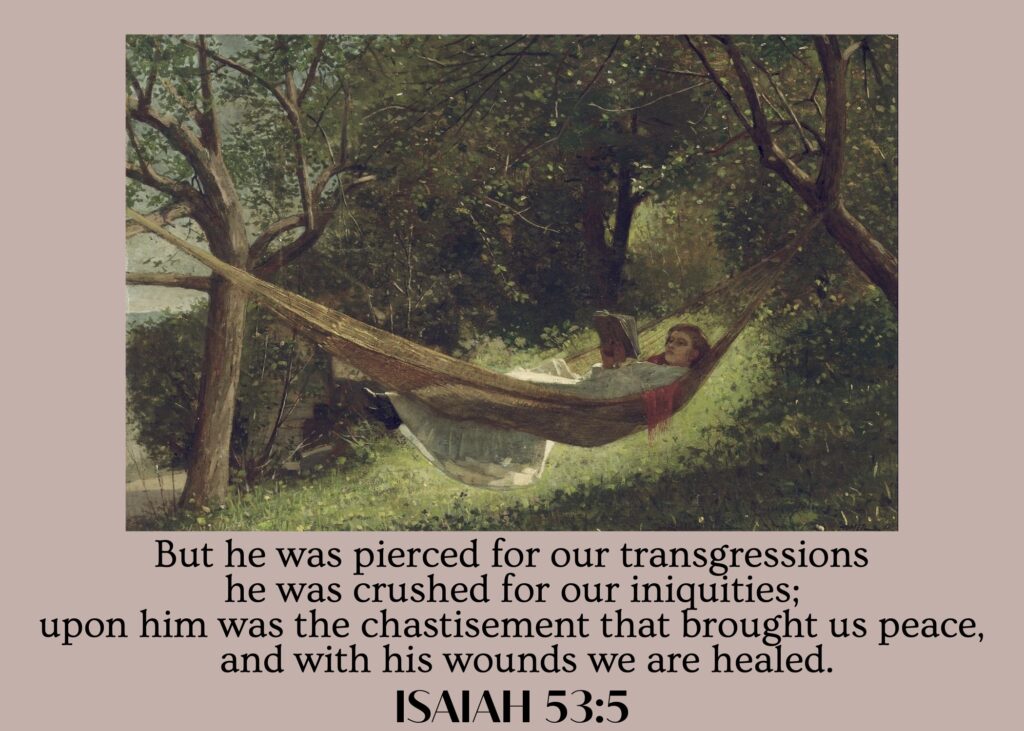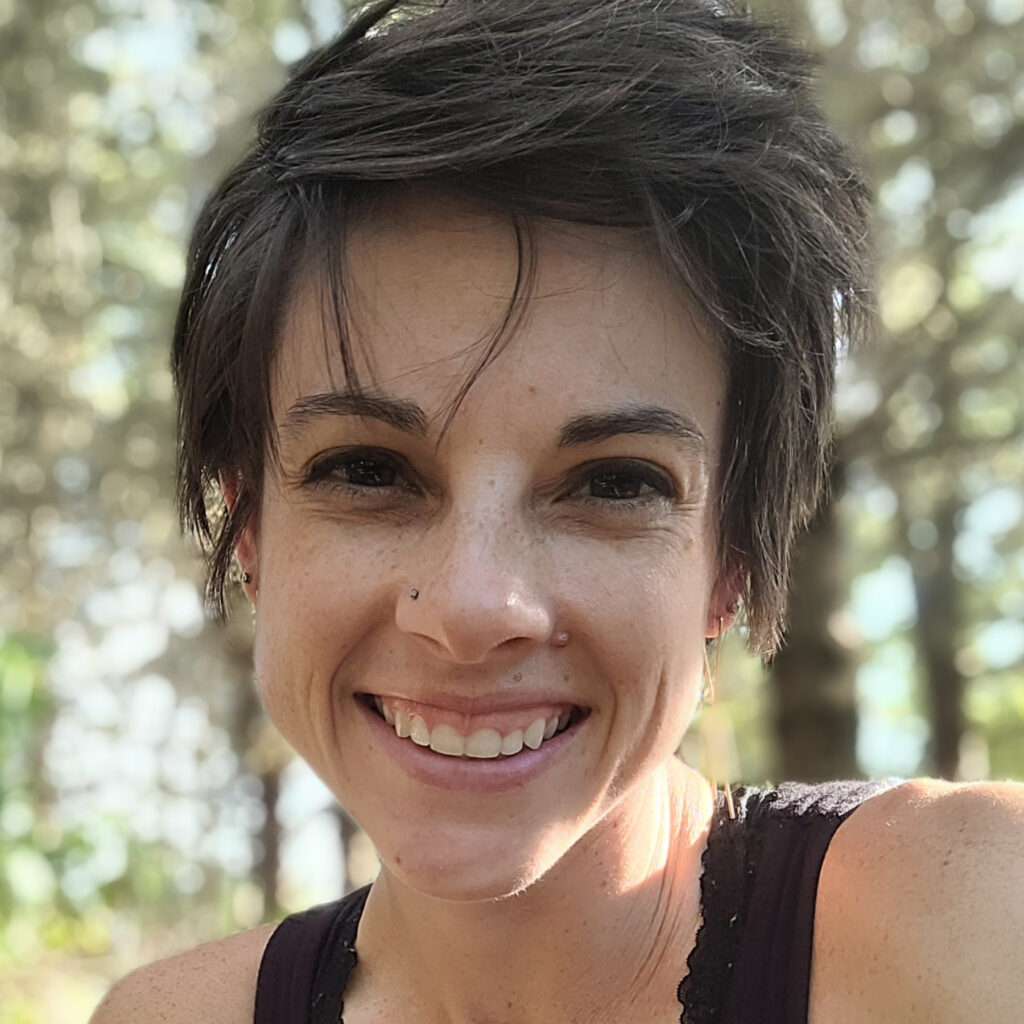By Millie Sweeny

As a child, I was enamored by the holy feeling of the Christmas season. I loved to conjure up a feeling of reverence as I gently arranged the nativity pieces, or considered the proper placement of an ornament. Lying under the tree, I would gaze up through the branches at the lights, enraptured with a feeling I was sure was peace.
Like Winslow’s Girl in the Hammock, my vision of peace was light-soaked and innocent. Childlike and beautiful. Untested.
Then I grew up.
Then came Christmases of illness, without loved ones, in uncomfortable family dynamics. I hurt people I loved and was hurt by them. The old wooden nativity and the twinkle lights didn’t feel big enough for the brokenness of the world anymore.
Wars and rumors of wars. Genocides. Famines. Labor strikes. Refugees. Mass murders. In our own small lives, we carry the not-so-small burdens of cancer, of divorce, of children who make bad choices and aging bodies that refuse to do what we wish they would. Our sons have life-threatening food allergies, and our mothers die before knowing their grandchildren. How can anyone speak to us of peace?
How can we even imagine peace, when we weep for those we know at home, and we weep for those we do not know abroad? When bombs drop on innocent children, and we are powerless against the machines and politics of wars that continue to bring harm and destruction and accept collateral damage as a just due.
How can we look forward to a season marked by a promise of peace, when the world around us seems to be crumbling, when we wake in the night with a pounding heart, anxiety turning our blood cold?
How can we sing the songs of our people in a foreign land?
Did Mary ask these same questions, I wonder?
What did she and Joseph talk about, on that long journey to Bethlehem? How many times, I wonder, were they harassed by soldiers, or felt unsafe as they passed by a Roman checkpoint? Jesus himself was born into such a time as this – of occupied lands, of oppressive political powers and civil unrest. His parents were poor and homeless (how easy to say this word here with empathy and how hard to apply the same to those on the side of my street), an unwed teen mother and her gentle fiance, trying to do the best they could.
Peace? No way.
Peace, the angels said. Peace on earth.
Thirty-three years later, the baby born this night would also promise His followers peace. Peace I leave with you, my peace I give to you. Let not your hearts be troubled, nor let them be afraid (John 14:27). How, then, could this man, born under an oppressive empire, a man who knew intimately the darkness and sorrow of living in this wounded world and who would soon be publicly murdered, promise peace? What could he have meant by it? And how can we approach that disconnect? A disconnect that feels just as real in my own heart today as it did two thousand years ago. The world is broken. The world is at war. My own body seems to be at war. And this season calls us to peace?
To describe peace as the absence of war is as unfulfilling a definition as describing light as the absence of darkness. Peace is not defined by its horrible opposite, but is itself a whole and beautiful thing. It is not an absence, but a presence. A Presence.
Shalom, in Hebrew, means much more than a lack of conflict. It entails the idea of wholeness, of flourishing. A full, beautiful, healthy experience of humanity that includes wellness, satisfying work that contributes to the good of the world and the glory of God, and a wholeness that implies knowledge of self and knowledge of God. Walking with God in relationship so that relationship spills out onto the world in beauty, cultivating goodness and growth as a gardener cultivates his gardens and fields.
Peace is the presence of our Living God, walking with us in the garden in the cool of the day.
It is, however, one thing to desire this heavenly version of life, to seek after flourishing and rightness in our own hearts — and another to work to bring it into being. The truth is that being a peacemaker, striving after shalom in our own hearts and in the world around us, means walking in the way of Jesus, which means stepping into the darkness, into the war.
Jesus brought peace to us by standing in the gap between our brokenness and the cost of our fall. He brought peace by bearing upon himself the consequences of the entire wounded world, by being broken himself. He was pierced, he was crushed, he was wounded, he was killed. All this to allow access to the throne of grace, to put death to death and begin to bring forth a kingdom of shalom. Upon him was the chastisement that brought us peace. (Isaiah 53:5)
Seeking shalom, actively seeking peace in this wounded world, in this broken and beautiful planet and in our hearts and relationships, means that to follow Jesus we must step into the places that are broken. And thus we, too, are liable to be broken. A teacher in the school hallways cannot break up a fight without stepping between the combatants, without risking catching a fist to his own face. A mother cannot save her child from a snarling dog without risking injury to herself. A soldier, a relief worker, a doctor cannot enter a war-torn country to bring aid without risking the loss of life, physical harm, or mental stability. A spouse cannot seek the reconciliation of a broken marriage without encountering the reasons for the break, without being wounded further in the uncovering of truth and hidden hurts.
To be a peacemaker, Jesus says in the beatitudes, is to be called a child of God. Like Christ, the son of God. He was broken in the ground between two parties at odds with one another — and he reconciled the two. The Prince of Peace did not experience earthly calm and lack of conflict; he willingly sought out the broken places, with reckless generosity of his very self.
Advent is a season of waiting, of joyous anticipation. We mark the days before the celebration of Christmas with candles, with chocolates, with feasts with friends, and we delight in the beauty of the season. It is a season often marked by busyness, but underlying often with a sense of joy, of peace, of hope for the coming celebration.
Advent marks the beginning of the liturgical Church calendar year. It is our New Year’s, our beginning again, our new story. We open the book again to say, “Once upon a time…”
It is a story rife with pain, with violence and sorrow. It is a story marked with war, as ugly as the conflicts raging in Europe and the Holy Land now. As painful as the arguments between family members. It knows the hurt of misunderstanding between friends, of betrayal and abandonment. It remembers the helplessness of creeping illness, the hopelessness of mortality, the grief of chronic sin. It settles in the painful places where refugees flee from persecution, where human organizations cause harm, where forgiveness must be given over and over again.
But, dear ones, we know the end of this story. We know the happily ever after. It is the promise of living with and in the presence of the Living God, to dwell with him in shalom, in peace and joy and flourishing, forever. This is what we celebrate and look forward to in Advent. This is why we proclaim peace, even when bombs are falling, or when the doctor has bad news.
Peace is in the no-man’s land between the trenches and barbed wire. It lies in the outstretched arms of a mother shielding her child from a soldier’s violence. It is inseparable from hope, joy, and love, for these are the themes of seeking renewal, of shalom and wholeness: We seek peace with hope, looking to the one day when the war zone will be turned into a garden of healing. We seek peace with joy, trusting that Christ’s blood redeems, that our bleeding hearts are singing the song of redemption. We seek peace with love, believing that the men and women on both sides of the barbed wire are beautiful images of God our King, are eligible for grace, are human and endowed with dignity.
Peace empowers, because it is Presence. Our God is with us, and our God is making all things new. And more, He is with us now. His presence and beauty “will flame out, like shining from shook foil,” as Hopkins wrote. It is far from absent, when we open our hands and ask, and open our eyes to see. It comes in moments of courage to step into a hard situation or in an afternoon resting in a hammock in the sunlight.
Peace, like hope, rises undaunted from the dust with bruises on her cheek. Peace, like joy, sings songs in the darkness. Peace, like love, stretches out His scarred hands to say All shall be well. Behold, I am making all things new! Come to me, all who are weary.
About the Author

Millie Sweeny is a Southern transplant in love with the Pacific Northwest, where she moved with her husband and kids eight years ago. A former writing tutor, she can usually be found kneading dough in the kitchen, driving to piano practice, or taking book club way too seriously. She writes regularly for Story Warren, occasionally for the Rabbit Room, and geeks out about books at instagram.com/millie.sweeny.
